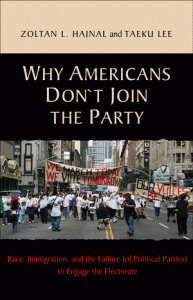 Zoltan Hajnal and Taeku Lee have written an unintentionally distressing account of what they envision American politics will look like in the multi-ethnic, no-one race-in the-majority by 2040 future: highly factional, replete with what they call “narrow casting to different voters”, and loaded up with niche issues that are designed to widen coalitions without simultaneously splintering them. It sounds like the polar opposite of Barack Obama’s coming out party in the Boston Garden in 2004, with its lofty sketches of a politics that avoided racial cleavages and appealed to some common ground.
Zoltan Hajnal and Taeku Lee have written an unintentionally distressing account of what they envision American politics will look like in the multi-ethnic, no-one race-in the-majority by 2040 future: highly factional, replete with what they call “narrow casting to different voters”, and loaded up with niche issues that are designed to widen coalitions without simultaneously splintering them. It sounds like the polar opposite of Barack Obama’s coming out party in the Boston Garden in 2004, with its lofty sketches of a politics that avoided racial cleavages and appealed to some common ground.
Interestingly, Hajnal and Lee don’t view it as distressing. They speculate that there is actually a virtue in this kind of politics, in that it would supplant the alternative of one racialized party matched against one white, homogeneous one. It is also striking that they describe their approach of “tightly packaged appeals to targeted [minority] electorates” as a strategic novelty, when it is anything but: even a cursory glance of modern politics yields, on the right, Richard Nixon’s cultivation of Catholics and white ethics, George W. Bush’s deploying of an anti gay marriage initiative to shift black votes in Ohio in 2004; and of course, what Hajnal and Lee describe is a fair rendition of the current Democratic pattern of wedge politics from the left: courting Hispanics with opposition to restrictive local immigration laws, blacks with protective rhetoric about voter ID requirements and, increasingly, with defenses of affirmative action in higher education (an issue the conservative dominated Supreme Court has committed to revisit in the next term).
I can cite any number of arguments from both ends of the spectrum why more of the above is hardly a political panacea. From the liberal perspective, there is a quality of cheap symbolism that is really studied avoidance of more contentious ground like African American poverty or citizenship status for illegal immigrants. On the right, policy minded conservatives might lament that the temptation for the GOP to wield gay marriage and perhaps abortion to offset the Democrats’ advantage with blacks and Latinos is at the expense of more substantive initiatives on education and entrepreneurship.
My gut reaction is that the two authors end up in such a curious place—treating old fashioned racial interest group politics as cutting edge and prescribing more of it despite the obvious costs—because they are trying to make sense of a not widely known phenomenon that their research uncovered: the surprisingly high levels of disengagement from among ethnic minorities from both parties. Their data suggests, for example, that among Asian Americans and Latinos, a majority don’t vote, and almost sixty percent of both groups are independent or don’t identify with either party; even within the monolithically Democratic black community, roughly a third express reservations that their interests are not adequately articulated by Democrats or Republicans.
Hajnal and Lee seem to assume that the disenchantment is a reflection of Tea Party era Republicans more or less rejecting ethnic based appeals entirely and Democrats making them ineffectively, or half-heartedly. But it may be just as likely that what Hajnal and Lee are discovering is decidedly more complex and disconcerting to liberals: perhaps two groups with strongly assimilationist tendencies, Asians and Hispanics, are actually turned off by the identity based appeals that already dominate liberal politics and are searching for an alternative. Perhaps even African Americans have a reservoir of doubt that the Democratic Party has delivered (or an emerging sense that newer constituencies have crowded out the space of influence blacks used to hold in the party).
There is a kind of Republican Party that would benefit from these openings—but not one that mimics Hajnal and Lee’s strategy of micro-targeted ethnic appeals. A conservative flavored version of the approach, more emphasis on black business development and aggressive courting of black evangelicals, fell flat in the early years of the last Bush presidency, and there is not much reason to think it would gain much traction today. The considerably more successful Bush 43 outreach to Hispanics seems a relic of a brief moment when a robust economy made comprehensive immigration reform feasible.
It may be, though, that Republicans can gain ground with the very sort of broad-based appeals that ethnic micro-targeting shunts to the side. A sustained Republican focus on the components of education reform, from overhauling tenure to promoting charter schools and vouchers, might make inroads with younger black and Latino professionals, who increasingly distrust public schools to educate their children. A new emphasis on making the tax code friendlier to two career families might pay dividends with the same cohort. Inevitably, the rise of eventual presidential contenders like Bobby Jindal and Marco Rubio will align Republicans with the ambitions of Asians and Latinos who have not seen a credible non-black minority emerge at the national level on the Democratic side.
In other words, instead of a narrowly crafted appeal to specific ethnic self-interest, an embrace of policy prescriptions and politicians that happen to resonate with minority aspirations for upward mobility. It’s a notably more promising vision of the multi-racial future than a doubling down on the niche politics of the last decade.
(Cross-posted, with permission of the author, from OfficialArturDavis.com)










Leave a Reply